Featured Participants
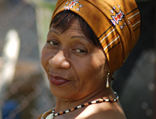
Geraldine Scarlett
Affectionately known as Miss Norma, Anderson's mom Geraldine Scarlett (nee Rowe) was born in the same tiny house as the film's director. As a seventeen year-old mother with her first child Geraldine had to grow up quickly as result of her newfound responsibility. Anderson's father Theophilus Anderson would offer support as best he could, but these were difficult times so everyone, including Roy's mother had to chip in. She left home at an early age with her young family and would eventually migrate to Canada in the early 1970s. Things didn't get any easier for Geraldine in her new country, but she continued to nurture and take care of her expanding family which now included one daughter and three sons. She was not the beneficiary of quality education, having left school before the sixth grade, but did see all her children whom she raised alone, ascend to higher education and go on to support families of their own
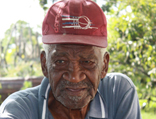
Lewis Rowe
Lewis Rowe was born in 1917 to Joseph Rowe and Caroline Rowe (nee Campbell) in the small village of Ridge Pen in the parish of St. Elizabeth, Jamaica. Growing up in rural Jamaica Rowe experienced life the way many youngsters did. It was more important to tend to the farms and assist the adult family members in whatever way necessary to eke out survival. Rowe was very close to his two older brothers Alfred and Ivan, the former being Anderson's grandfather. Prior to Rowe's passing 2009, he recounted to his nephew Roy details about the family history that was previously not known to any other family member alive. This was a major triumph for Anderson because with his uncle's oral tales and documentary evidence uncovered, he was able to put his family history in a clearer focus. September 15, 2009 was a bittersweet day for Roy – for on the day he celebrated his birthday, he also mourned the loss of his dear uncle.
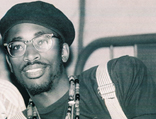
Adisa S. Oji
Adisa Oji has a love for documenting the daily lives of Africans around the world. This young man has developed into a curious modern nomad who shares his time between the African continent and North America. Oji's life parallels the Jamaican Maroons of the past. While he is not physically fighting an "opponent" like the Maroons who fought for their freedom, Oji's experiences could be referred to as a twenty first century manifestation of marronage. He seeks freedom from an institution that would seek to shape the heart and minds of Africans and those of the Diaspora. By virtue of the fact that he changed his name and is rearing a family in Ghana is a bold statement by itself. In fact the aim of his company Mother Africa's Children Photographic Reproduction International (MACPRI) is to stimulate through the use of positive visual propaganda, "radical change, revolutionary change, in the way we see and organize ourselves as a people and the way we are seen by others." Oji is also Roy's younger brother.

Dr. Verene A. Shepherd
Dr. Shepherd is Professor in the Department of History at the University of the West Indies, Mona Campus, Jamaica. She is a member of the United Nation's Working Group of Experts on People of African descent. A prolific author, Professor Shepherd has received numerous awards, most recently a Publication Grant from the University of the West Indies for Slavery Without Sugar (2001). Among her other publications are Livestock, Sugar & Slavery: Contested Terrain in Colonial Jamaica (2009) and I Want to Disturb My Neighbour (2007). Dr. Shepherd is also the recipient of the Jamaica National Heritage Trust Award for contribution to Jamaican history and heritage.
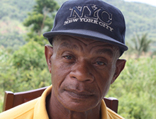
Colonel Peddie
Sydney Peddie served as Colonel of Accompong from 2000-2010. He is very much aware of the economic challenges that his community faces. During his time in office he was very active in his attempt to forge alliances with non-Maroon institutions such as the Tourism Product Development Committee (TPDCo.) in a bid to make his remote town a major tourist destination. "If we make our village a good tourist destination" says Peddie, "then we will be able to provide more job opportunities."
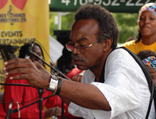
Colonel Frank Lumsden
Frank Lumsden has been the leader of the Charles Town Maroons since 2005. Born several miles away in the town of Buff Bay, Lumsden, an avid sportsman, attended Southern Illinois University on an athletics scholarship. After graduating from SIU in 1970 with a Bachelor of Science degree in business management, he entered the world of finance. Then one day, suddenly, Lumsden left the corporate world and turned to his lost love – art. Today his work can be found in hospitals and homes and other institutions in the United States, Austria, Germany, and Jamaica. Colonel Lumsden is in Charles Town to help preserve the culture. Under his leadership, he aims to use culture as an anchor for development. Lumsden also contributes original artwork to this film.
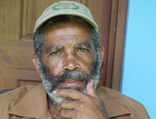
Colonel Wallace Sterling
Wallace Sterling was pre-ordained for the position of Colonel of Moore Town, a title he has held since 1995. "For as far back as I can remember," He says, "my mother and father were involved in community activism." The elder Sterling held the post of Secretary of the Maroon Council for some thirty years, while his wife was very involved in the church and other local and national groups. "As a youngster growing up, I was chairman of the youth club," he continues. "I definitely had leadership aspirations as a young boy." Colonel Sterling, born and bred in Moore Town, was immortalized in the 1978 film "Moore Town: Capital of Earth." He is passionate about the culture, and this film owes him a great deal of gratitude for his participation and his profound views shared on Maroon culture.

Dr. Kenneth L. Bilby
Kenneth L. Bilby, author of the book True-Born Maroons (2005), began his study of the Maroons in the 1970s as a postgraduate student in the United States. A native New Yorker, Bilby points out that the present day residents of Jamaica's Maroon communities still possess an authentic, historical, continuous culture of their own but it is not without its challenges. He has created an affinity with Jamaica and its culture from an early childhood when he would regularly visit his grandmother who lived in St. Ann's, a northern parish in Jamaica. He points out: "…although I had heard about the Maroons, it was always some sort of vague reference…to those 'people' up in the hills. Nothing was taught about them in schools, at least in the US. It was such an inspiring story. That always stuck with me."
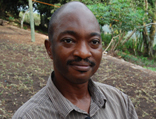
Dr. Emmanuel K. Akyeampong
Emmanuel Akyeampong is a professor of History at Harvard University. Born in Ghana, Dr. Akyeampong received his PHD in African History from the University of Virginia in 1993, and his bachelor's degree in history from the University of Ghana at Legon. Professor Akyeampong is one of Africa's pre-eminent scholars. In 1998 he delivered the Distinguished Africanist Address at Boston College, entitled Ghana: Reflections on 40 Years of Independence. As a former chair of the Committee on African Studies at Harvard, he has been instrumental, along with Professor Henry Louis Gates, in establishing the Department of African and African American Studies. For this film Professor Akyeampong provides a unique perspective on the inner working of the African and Atlantic slave trade, during the eighteenth and nineteenth centuries.

Dr. Marcus Rediker
Marcus Rediker is a distinguished professor of history at the University of Pittsburgh. He has many publications to his credit, including the seminal book The Slave Ship: a Human History (2007). His honors and awards that include a 2008 George Washington Book Prize are just too numerous to mention. Dr. Rediker's invaluable contribution to this film is the unique perspective and analysis he provides on what is one of the most inhumane institutions of slavery – the slave ship. Sometimes referred to as a floating dungeon or prison, it was also a naval battle ship that had as its tour guide from the point of embarkment to dis-embarkment the ever-present sharks, who feasted on a steady diet of human flesh – mostly slaves who were thrown overboard, whether involuntary or not.

Dr. Roger N. Buckley
Roger N. Buckley is Professor of History and the founding director of the Asian American Studies Institute at the University of Connecticut, Storrs, CT. He was born in New York City to immigrant parents from the Caribbean. He earned a Ph.D. in British Empire History from McGill University in Montreal, Canada. Dr. Buckley is the author of several books that examine British military participation in the Caribbean, notably; The British Army in the West Indies (1998), and Slaves in Redcoats: the British West India Regiments, 1795-1815 (1979). Over the years, he has received numerous research awards, among them the National Endowment for the Humanities, the John Carter Brown Library Research Fellowship at Brown University.
